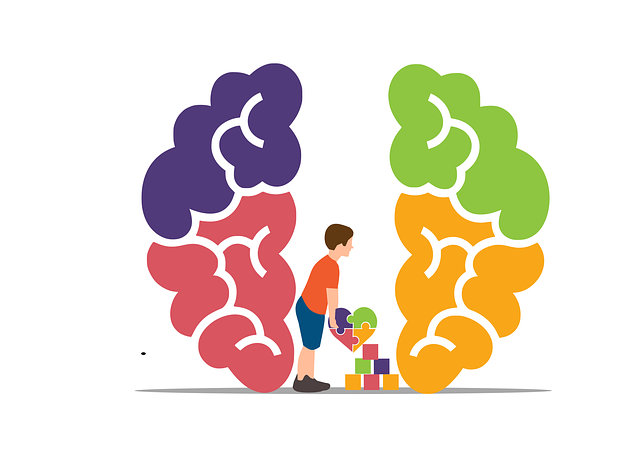Burnout among healthcare professionals at Englewood Adolescent and Teen Therapy poses significant risks to individual well-being, patient care, and system sustainability. Driven by factors like heavy workloads, long hours, and misaligned personal values, burnout leads to decreased job satisfaction and higher turnover rates. Strategies such as Coping Skills Development, Mental Wellness promotion based on Mind Over Matter principles, mindfulness meditation, and evidence-based therapeutic techniques are crucial for mitigating burnout, enhancing resilience, and improving professional satisfaction and clinical performance. Englewood Adolescent and Teen Therapy prioritizes provider well-being through these approaches, fostering a supportive work environment that encourages open communication, peer support networks, mentorship programs, and mental health risk assessments to boost job satisfaction and maintain exceptional patient care.
Healthcare provider burnout is a growing concern, impacting not just individuals but the entire healthcare system. This article explores effective strategies to prevent and mitigate burnout among healthcare providers, focusing on the comprehensive approach adopted by Englewood Adolescent and Teen Therapy. We delve into the causes and consequences of burnout, highlight organizational and colleague-driven solutions, and provide insights that can be adapted across various healthcare settings.
- Understanding Burnout Among Healthcare Providers: Causes and Impact
- Effective Strategies for Prevention and Self-Care at Englewood Adolescent and Teen Therapy
- Creating a Supportive Work Environment: The Role of Organizations and Colleagues
Understanding Burnout Among Healthcare Providers: Causes and Impact

Burnout among healthcare providers is a growing concern, affecting not just individual well-being but also patient care and the overall sustainability of the healthcare system. It’s essential to understand that burnout isn’t merely fatigue; it’s a state characterized by emotional exhaustion, depersonalization, and reduced personal accomplishment (Maslach & Jackson, 1981). In the high-pressure environment of healthcare, especially in settings like Englewood Adolescent and Teen Therapy, where intense emotional demands are common, professionals can struggle to cope.
Causes of burnout are multifaceted. They include heavy workloads, long hours, lack of control over work processes, insufficient rewards or recognition, and a mismatch between personal values and professional experiences (Snyderman et al., 2018). The impact is profound: decreased job satisfaction, increased turnover rates, and potential harm to patient outcomes. Strategies like Coping Skills Development and fostering Mental Wellness are crucial in mitigating these effects, promoting resilience, and upholding the well-being of healthcare providers—essential components of Mind Over Matter Principles that can significantly enhance professional satisfaction and clinical performance.
Effective Strategies for Prevention and Self-Care at Englewood Adolescent and Teen Therapy

At Englewood Adolescent and Teen Therapy, we recognize that burnout is a significant challenge for healthcare providers, especially in the demanding field of adolescent mental health. To combat this, our team employs effective prevention strategies focused on fostering self-care and emotional resilience. We encourage practitioners to prioritize their well-being by integrating mindfulness meditation practices into their daily routines. This simple yet powerful tool helps reduce stress, enhance focus, and cultivate a sense of calm, thereby preventing burnout.
In addition to mindfulness, we promote the development of inner strength through evidence-based therapeutic techniques tailored to each individual’s needs. By nurturing emotional intelligence, therapists at Englewood Adolescent and Teen Therapy empower themselves to better manage challenging situations, build strong therapeutic alliances with teens, and ultimately provide exceptional care. These proactive measures ensure that our healthcare providers maintain their passion, compassion, and resilience in the face of adversity.
Creating a Supportive Work Environment: The Role of Organizations and Colleagues

Creating a supportive work environment is a collective effort involving both organizations and colleagues, playing a pivotal role in preventing burnout among healthcare providers, especially in settings like Englewood Adolescent and Teen Therapy. Organizations should prioritize open communication strategies to ensure professionals feel heard and valued. This includes regular staff meetings where concerns can be openly discussed and collaborative problem-solving approaches adopted. A culture that encourages feedback and actively works on implementing changes based on staff suggestions fosters a sense of belonging and engagement, reducing stress and burnout.
Colleagues also have a significant role to play in creating this supportive atmosphere. Peer support networks and mentorship programs can help alleviate work pressures. Mental health professionals can benefit from having peers they can confide in, seek advice from, or simply share lighthearted moments with during stressful periods. This social connection not only provides emotional support but also enhances job satisfaction and resilience against burnout. Additionally, incorporating risk assessment tools for mental health professionals and promoting Mind Over Matter principles can further strengthen the organization’s efforts to protect its workforce.
Burnout among healthcare providers is a pressing issue, but through comprehensive strategies like those implemented at Englewood Adolescent and Teen Therapy—including self-care practices, organizational support, and collaborative environments—it can be effectively mitigated. By fostering a culture that prioritizes well-being, organizations can enhance job satisfaction, improve patient care, and retain valuable talent. This holistic approach to burnout prevention is essential for creating sustainable and resilient healthcare systems.









